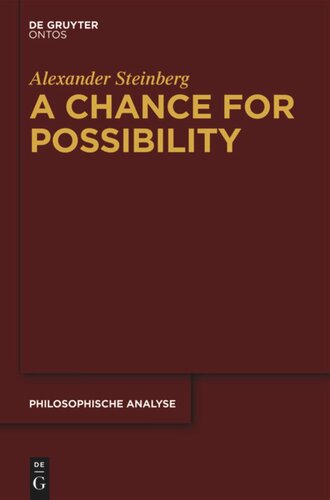

Most ebook files are in PDF format, so you can easily read them using various software such as Foxit Reader or directly on the Google Chrome browser.
Some ebook files are released by publishers in other formats such as .awz, .mobi, .epub, .fb2, etc. You may need to install specific software to read these formats on mobile/PC, such as Calibre.
Please read the tutorial at this link: https://ebookbell.com/faq
We offer FREE conversion to the popular formats you request; however, this may take some time. Therefore, right after payment, please email us, and we will try to provide the service as quickly as possible.
For some exceptional file formats or broken links (if any), please refrain from opening any disputes. Instead, email us first, and we will try to assist within a maximum of 6 hours.
EbookBell Team

0.0
0 reviewsWinner of the 2012 GAP/ontos Award
A Chance for Possibility defends the view that the objective modal realm is tripartite: truths about possible worlds supervene on modal truths, which in turn supervene on truths about objective chances.
An understanding of supervenience in terms of grounding is developed which — unlike the standard modal characterization — allows the question of what modal truths supervene on to have a non-trivial answer. Relying on this understanding, a negative result is established: modal truths do not supervene on truths about possible worlds, whether possible worlds are conceived of as Lewisian concreta or as abstract objects of some kind. Instead, a conception of pleonastic possible worlds is developed that reverses the direction of supervenience. On the basis of linguistic considerations concerning our use of natural language ‘might’ and ‘might have’ sentences, Steinberg finally argues that truths about objective chances are able to provide a supervenience base for modal truths.
A Chance for Possibility is an investigation in analytic metaphysics, drawing on related work in the philosophy of logic and language as well as linguistics. It provides a detailed case study for the fruitful use of a notion of grounding in the clarification and evaluation of longstanding philosophical issues.